#mr ismay
Explore tagged Tumblr posts
Text
Guess who keeps getting suckerpunched by another Hazbin Headcanon. Repeatedly. This one's starting to become a problem considering whenever I watch related content there is a 78% chance of it popping out of the woodworks.
Alastor absolutely, 100% believes the absolute worst about J. Bruce Ismay. To the point that even the slander from 1912 to Al sounds like someone trying to make Mr. Ismay look better. You'd have a better chance making Alastor say something nice about Vox than about Mr. Ismay.
Alastor is also 100% convinced that Mr. Ismay got hunted down by the exorcists with prejudice the moment he died even if he died outside extermination day because Al can find absolutely no sign that Mr. Ismay has ever been in hell. Alastor is wrong about that.
#hazbin hotel#hazbin headcanon#hazbin alastor#titanic#J Bruce Ismay#conversely alastor doesn't believe anything bad about Lightoller#al is convinced the guy landed in hell by accident#instead of the war crimes#vox btw thinks cameron got mr ismay 100% right#which is still a Very Bad Interpretation#considering cameron really fucked up with the historic characters including mr ismay#but it's better than al being convinced that mr Ismay was the one with the warcrimes#i have a LOT of feelings about cameron's titanic movie that I may post a rant about sometime in the future#also related content does not mean titanic content annoyingly enough#related content means ocean liners#but maybe with this the percentage goes down a bit
5 notes
·
View notes
Text
In The Gloomy Depths [Chapter 5: Ruby]

Series summary: Five years ago, jewel mining tycoon Daemon Targaryen made a promise in order to win your hand in marriage. Now he has broken it and forced you into a voyage across the Atlantic, betraying you in increasingly horrifying ways and using your son as leverage to ensure your cooperation. You have no friends and no allies, except a destitute viola player you can’t seem to get away from…
Series warnings: Language, sexual content (18+ readers only), parenthood, dolphins, death and peril, violence (including domestic violence), drinking, smoking, freezing temperatures, murder, if you don’t like Titanic you won’t like this fic!!! 😉
Word count: 5.5k
💜 All my writing can be found HERE! 💜
Tagging: @nightvyre @mrs-starkgaryen @gemini-mama @ecstaticactus @chattylurker, more in comments 🥰
💎 Let me know if you’d like to be added to the taglist 💎
Scarlet dusk spills over the pine planks of the deck like rising water. Sweet little Madeleine Astor invites you to attend dinner with her party—perhaps there is gossip that you and Daemon have had some sort of a row—but you have other plans. As the rest of the first-class passengers descend the Grand Staircase to the dining room on D-Deck, you make your way eastward towards the stern. You pass shipbuilder Thomas Andrews, who is ambling along with a group of chuckling, pipe-puffing gentlemen including J. Bruce Ismay and Benjamin Guggenheim. Mr. Andrews is mentioning the iceberg warnings that the captain has received from nearby vessels today; the other men are agreeing that Captain Smith is right to not be concerned. On a night as calm and cloudless as this one, surely an iceberg would be spotted by the lookouts with more than enough time to steer the ship to safety.
Aegon is waiting by the steel railing of the stern, stolen black coat, face glowing in fading daylight the color of sunstone, a crystal mined in Oregon. His scuffed brown leather portfolio and a folded easel are tucked under one arm; in his fist is clutched the handle of a small wooden box, which must contain his painting supplies.
“So,” he says, smiling when he sees you’ve accepted his offer, this final kindness before you are torn away from each other when Titanic docks in New York Harbor. “Where should we set up our studio? It can’t be in my cabin. One of my roommates is currently fornicating with a Russian girl. She seems nice. I hope she isn’t burdened with his bastard child.”
“You don’t think we should join them?”
He laughs. “Maybe I’m not ready to share you.”
“You’re not living up to your reputation, prodigal son. I had heard you were an irredeemable miscreant.” Then you turn to leave, and Aegon follows you.
You stop first at the Café Parisien on B-Deck, which is mostly deserted; it’s very cold outside, approaching freezing temperatures as the sun sinks below the bloodied horizon, and the heaters don’t work especially well in the restaurant. You purchase several different sandwiches and a chocolate croissant. No cash exchanges hands, which is good because you don’t ever have any; the stewards there recognize you and will add the charge to your illustrious husband’s bill, to be paid before passengers disembark on either April 16th or 17th, depending on how quickly Titanic arrives at her destination.
Daemon and Rhaenyra will be in the First-Class Dining Saloon for the next several hours, and thereafter will almost certainly steal away into her rooms to commit their incestuous adultery. Rush is eternally prowling nearby in case Daemon finds himself in need of anything: a drink, a gun, a troublesome wife shoved over a railing. Per her nightly tradition, Dagmar has taken Draco to the Verandah Café, which in addition to being a more casual eatery has become a sort of playroom for first-class children. And so in your staterooms, only Fern is present, finishing up some dusting before she journeys down to C-Deck to enjoy dinner in the Maids and Valets Saloon. From above the fireplace, the taxidermied tiger head watches you with eerily still gemstone eyes, a dispassionate witness to your treason.
“Hello, ma’am,” Fern says when you enter. “Can I make you a cup of tea before I go?” Then she sees Aegon walk in behind you with all his equipment, and she blinks, bewildered. “Good evening, sir. Did we meet on the Boat Deck this morning…?”
“We did,” Aegon replies a bit sheepishly. Fern looks at you, seeking an explanation.
“I need a favor,” you tell her.
“Of course, ma’am. Anything.” But Fern’s large dark eyes shift skittishly between you and Aegon.
You give her the paper bag heavy with treats from Café Parisien. “I’ve brought you dinner. I wasn’t sure what kind of sandwich you’d prefer, so there’s ham and Gruyère, tomato and chèvre, and pâté and cornichon. Eat whichever you like, or all three, it doesn’t matter. Oh, and there’s a chocolate croissant as well, nice and flakey and shining with butter. It’s absolutely massive.”
“That’s very kind, ma’am,” Fern says. She’s touched, but she’s still puzzled.
“Fern, I’m asking you to stay here in the sitting room. It doesn’t matter what you do, but don’t fall asleep, and for God’s sake don’t leave to go outside, not even for a moment.”
“Alright,” she agrees cautiously.
“I don’t think they’ll be back for a few hours, but if somebody does walk through that door—Daemon, Dagmar, anyone—all I need you to do is offer to make them tea, as you would on any other night. And offer loudly.” This will alert you to the intruder and give you more than enough time to get Aegon out onto the private deck, from which he can access the hallways of B-Deck and the Grand Staircase.
Fern understands. She nods, studying Aegon thoughtfully. “Yes ma’am.”
“And I didn’t have any visitors.” Your voice is grave; it is not only your reputation at risk. It’s your life.
Fern feigns shock. “Of course not. I haven’t seen a soul.”
You touch a palm to her shoulder, fleeting and gentle. “Thank you, Fern.”
“It’s no trouble at all, ma’am,” she says, and then goes to the small circular table and begins to unwrap one of the sandwiches from Café Parisien.
As soon as you and Aegon are inside your bedroom, you push Daemon’s writing desk in front of the door, precious extra seconds bought in the unlikely event that your husband returns and Fern can’t slow him down. Aegon immediately begins setting up: placing his easel, clipping a piece of fresh linen-like parchment from his portfolio to it, and removing a palette, brushes, and tiny tin tubes of oil paint from his wooden box. He turns off all of the lamps except one, then glances at the unlit white candles on the dresser and the nightstand. Before he can say anything, you take his aluminum lighter from your handbag and light the wicks.
“Can I do anything else to help?” you ask.
“Yeah.” Aegon nods to your spacious walk-in closet, where the door is hanging ajar. It’s nearly as large as his entire third-class cabin. He shrugs off his black wool coat; beneath it he is wearing only a white button-up shirt and dark green corduroy trousers. “Get dressed. Put on something you feel like you look especially good in.”
You gaze blankly at the closet, then turn back to him. “I don’t think I look good in anything.”
“Well now I’m going to make you watch.” He smirks at you, mischievous, teasing, then drops to his knees to squirt beads of paint onto his stained palette: golden like the lamplight, a rich dark brown like the walnut wood of the bedposts.
“How would you possibly accomplish that?”
“You have a mirror.” He points to it with a paintbrush, the oval-shaped pool of silver standing upright by the bed.
You gape at it, mortified. “No, I couldn’t possibly stare at myself the whole time.”
“Sure you could.” Aegon goes to the mirror and adjusts it until it is filled with your reflection. “Not too bad, right?”
“I suppose,” you murmur, but you have already fled to the closet. As Aegon swirls colors together on his palette, searching for the perfect shades, you sift through your collection of jewel-toned fabrics: lace, cotton, velvet, wool. You think again of the dusk light that turned the decks and waves to rubies, and your eyes catch on a red silk robe: purchased only a month ago, never worn yet, no memories of Daemon or anybody else, a new age like sunset or dawn. You take off your green gown and remove the emeralds from your ears, then don the crimson-colored robe and return to the bedroom to meet Aegon, silk flowing behind you like a riptide, the rustling of your legs beneath the fabric.
Aegon is scrabbling around by the foot of the bed, smoothing out any bumps in the Turkish rug, straightening the white ruffled bed skirt that hangs down to the floor. He peers up at you and freezes, his fretful fingers going still.
You ask tentavively: “Is this okay?”
He chuckles. “Okay is one word for it. Come over here.”
You go to Aegon and he takes your hands, both of them, and draws you down onto the floor where he is. You sit with your legs bent and tucked to the right, as if you’re a mermaid, your tail the color of blood instead of cool rippling depths. Aegon arranges the hem of your robe—he wants your bare feet showing, the silk rumpled in some spots and smooth in others—then retreats and stands back to study you, chewing the corner of his full bottom lip, his hands on his waist.
“Can I take your hair down?”
“Sure,” you say, but when he touches you—even a graze, even a whisper—you have to stop yourself from startling a bit, from reaching out to grab his wrist and keep him close.
“I can paint from memory,” Aegon tells you as he works, perhaps filling the quiet to soothe your nerves. “But it always turns out better if I have the person in front of me.”
“I’ll try to stay still.”
“You can move around if you have to,” he assures you. “I’d rather have you comfortable. I know you’re not a statue.”
“Right.” You smile. “I’m a rock.”
Aegon laughs and places your left hand on the bedpost as if you are clinging to it. “The best rock. Now let’s see you glimmer.” He goes to the mirror and repositions it one final time, angling it downwards slightly so you are in the center of the glass oval. From behind you on the dresser, flickering dots of candlelight glow like stars. You instinctively avert your eyes from your reflection, but Aegon is insistent. Gingerly, he turns your head back towards the mirror before striding over to his easel.
You do not want to watch yourself, so you watch Aegon instead, his doppelganger reversed in the glass. He’s mixing paint on his palette, repeatedly glancing at your robe to make sure he’s made the correct shade of red. He’s absentmindedly tucking a lock of his hair behind his ear. And you cannot stop staring at his hands: the way he holds a paintbrush, the bumps of his knuckles. He is not a man who has ever pillaged or bruised but only created pinpoints of light that gleam through the darkness, music and art and laughter, the gems of human existence. He is far from home, just like you are. His bones are the bars of a prison; you have married into the same one, created new life with it, melded your bloodlines together like forged metal.
Now Aegon is back, his reflection kneeling behind yours, and he begins to reach for your waist before he stops himself. “Is it alright if I…?”
“Of course. However you want me.”
The Aegon that lives in the silver sheen of the mirror settles his hands lightly just below your ribcage. He turns you just barely towards the mirror, only an inch away from where you were before, but he is precise, he is careful. This is the last image he’ll ever capture of you.
The warmth of him against you, his weight, his wonder as he gazes at your reflection with eyes like deep water; your breath catches, and at first he fears he has crossed a line and removes his hands. But your fingers are—slowly, like a suggestion that someone could so easily pretend not to have noticed—pulling up the hem of your silk robe, to just above your ankles, to your calves, to your bent knees. Aegon’s right hand covers yours, and then—as your eyes lock in the mirror—skates up the inside of your thighs as you part them, displacing the vivid red of your robe, revealing yourself in the glass, and so you can see it as he touches you, not like he owns or commands or uses you but like he is here to chisel you free from the perpetual darkness of the mine you’ve been trapped in for millennia.
You gasp in desperate, disbelieving relief, shaking all over, and you move to kiss him; but Aegon catches your face in his other hand and turns you back to the mirror. “No,” he whispers. “Watch.” And then he presses his lips to the apple of your cheek and lingers there for a moment, tasting you, breathing you in like you’re water filling the lungs of a drowning man.
“Aegon…”
“I want you to see how beautiful you are. I want you to see what I’ve been dying to do to you.”
His right hand is still between your legs, his fingers circling, a whirlpool that drags you down like an anchor until you hit the seafloor, an ocean not of pressure and cold but bright, yearning warmth, golden lamplight and flickering candles. You reach back to touch Aegon’s face—the stubble of his short beard, the sand-colored strands of his hair—but still he keeps your gaze fixed on your reflection. Now you are unashamed in a way you haven’t been since before your wedding night five years ago, just about the same time Aegon was leaving home. The proof is indelible, inking itself into your memory like a painter’s signature: you are desired, you are loved.
“Thank you,” you moan, so low it’s almost inaudible. You’re close. You’re very, very close. “Oh my God, Aegon, thank you…”
“Shh.” He kisses the side of your face, his eyes on the mirror, transfixed. “Show me.”
It’s a beam of sunlight refracted and scattered by a ruby; it’s a scalding torrent of blood that crashes through a web of arteries all the way to the heart. And when—still shuddering, still fighting for air—you pull away from Aegon’s grasp, he lets you go without any resistance.
You roll onto the floor and drag him on top of you by his shirt, struggling with trembling fingers to untangle the tie of your robe until Aegon realizes what you’re trying to do and helps you. He opens the blood-red silk and tastes the salt blooming on your belly, your breasts, your throat where your pulse is thudding drunk and maroon in your carotid. It’s better than cider or champagne or beer or nicotine; he is not a poison but a cure. He is unbuttoning his shirt and his trousers, hurried famished need. He is inside of you, and he is kissing you deeply, your palms on his flushed face, your hips moving with his. You steal a glimpse of the silver-moonlight mirror, and there you both are: lost and far from home, shipwrecked on the same island, castaways and wave crests and mirages. In the end, you know you have not disappointed him. His lungs are breathless and his eyes wet, his muscles just as spent and useless as yours. Neither of you are lost anymore. You have found each other here in the gloomy depths.
Almost immediately, Aegon forces himself off of you and crawls towards his easel, at last staggering to his feet. He grabs his palette and a brush and begins working with frenetic strokes, his damp hair falling in his face, his brow knit with concentration. You don’t have to ask what he’s doing. He’s trying to paint you before the memory begins to fade. He works in thin layers, just enough to cover the white of the parchment. His visions are soft and fragile like dreams, things that can be blown away and forgotten. From where you’re still lying on the floor, you gaze up at Aegon as he paints.
Is it possible that I’m in love with him? Is it possible that after this voyage I’ll never see him again?
You have no sense of how much time has passed when he finally looks over at you and says: “I think it’s done.”
You stand and wander across the bedroom, your red robe still open and hanging loosely from you like flayed skin. On the paper you find two faces instead of one, you in a golden haze of ecstasy no one else can see the cause of, Aegon whispering as your fingertips reach back for him.
He has written in black in the bottom right corner of the painting: Petra and Picasso.
~~~~~~~~~~
Aegon doesn’t want to move it yet. The oil paint needs hours to dry, and he’s worried that if he takes it outside while it’s still wet, the wind screaming down from the Arctic might be cold enough to make the paint freeze and chip away, and the momentary lust-red magic he’s captured will be gone. So with the new painting still clipped to it, you hide Aegon’s folded easel, the leather portfolio, and the wooden box of supplies under your bed, concealed by the white ruffled bed skirt. You both take turns cleaning up in the bathroom—someone always listening for the noise of an unwelcome interloper—and Aegon shimmies back into his clothes while you change into a blue dress, velvet for warmth, pale like ice.
“Where can we go?” you ask Aegon as you put on a coat, heavy white wool. I don’t want to say goodbye to you yet.
He must feel the same way. He pushes Daemon’s writing desk back to its original place, unblocking the door. Then Aegon offers his hand and you take it.
You walk together into the sitting room. Fern looks up from where she’s perched on the sofa and sewing closed a rip in the sleeve of one of Dagmar’s charcoal-colored dresses, her eye wide.
“Thank you, Fern,” you say, calm and drowsy. “That will be all for tonight.”
“Yes ma’am.”
“How can I repay you?” You don’t have your own money, your own land; even the jewels in your collection belong to Daemon. You’d give them all up if they could buy your freedom. You’d let them sink into the dark cold North Atlantic Ocean, emeralds and rubies and sapphires. Randomly, you think of Daemon’s gemstone-studded dagger, the hilt glinting with gold.
Fern replies: “Never send me away to live with people who don’t bring me chocolate croissants.”
You dash to the sofa and hug her; Fern is stunned but accepts your embrace, warily patting your back as if the bones beneath might be porcelain or glass. Then you clasp Aegon’s hand again and vanish with him into the hallway.
Most of the men are still at dinner or have moved to the First-Class Smoking Room, the women are still gossiping and sipping their champagne, and so you and Aegon slip through the heated corridors like sharks in warm currents. He leads you towards the stern, to the section of the ship reserved for his chosen people, then down to F-Deck and the Third-Class Dining Saloon. They are just beginning to move the tables out of the way for dancing. You find a quiet corner of the room and take off your coats, then Aegon disappears for a moment and returns with a tray: two plates full of corned beef, cabbage, carrots, and potatoes, two bowls of plum pudding, two cups of tea, a dark bitter pint of Guinness for you. You can feel your face light up when you see Irish food.
“You’re lucky you weren’t down here for breakfast,” Aegon tells you. “We had fried tripe and onions.”
“Oh, awful,” you say, laughing. You take a bite of corned beef and close your eyes, thinking of Saint Patrick’s Day with your family each year, always a cold wet day in March, green hills and grey mist. When you open your eyes, Aegon is smiling.
“A little taste of Ireland.” Now he is wistful. Across the room, the musicians Aegon sometimes plays with have climbed on top of a table and are performing My Wild Irish Rose as couples whirl around the floor. “I’ll miss it. I love the music and the people. Perhaps one in particular.”
“What are you going to do when you get home?”
“I’m going to tell Aemond he has to teach me how to be a duke,” Aegon says casually as he eats. “I can’t really give it up, unfortunately. The title belongs to the Crown, not my family. It can be taken away any time the king decides he wants to. And he’s a strict one, George V. He’s humorless, he’s harsh. If I refuse my inheritance, I can’t just pass it along to Aemond, not unless the king agrees. But the way I am…my failings, my lack of restraint…it makes my bloodline look like bad stock, doesn’t it? Especially with all that eugenics bullshit floating around. I don’t want my mother and siblings to lose everything because of me. My mother has spent her entire life miserable, I figure she should have something to show for it.”
The Hightower branch of the family are phantoms to you. You know them only from newspaper articles and erratic gossip and sneering remarks muttered by your husband. You take a swig of your Guinness, and for the first time in as long as you can remember you don’t feel like you want to have another. You don’t want to take the jagged edges off this moment, hidden below deck with Aegon for what is almost certainly the last time. You don’t want to forget anything about him. “What’s Aemond like?”
“Superior to me in every way,” Aegon says. “Disciplined. Clever. Very tall.”
“I myself favor short, delinquent artists. Those tall clever dragons are nothing but trouble.”
He snickers, shaking his head. “I’m not a real artist.”
“Sure you are. You’re Picasso.”
He’s watching you with murky blue eyes, dazed and marveling. “What are you going to do when you’re back in Ireland?”
It’s a fantasy, a folktale. I’ll never see Ireland again. “I’m going to help take care of my father. He’s…he’s not well, and he hasn’t been for a long time. His memory is failing. I want to make his last years as painless as possible. I want to spent time with my mother again, I want to go on walks and sit in the garden and read books and paint our ugly little pictures. We used to play this game where we’d each paint an animal and then have the other guess what it is. It once took her twelve tries before she realized my grey blob was supposed to be a basking shark. I saw one washed up on the shore when I was little.”
Aegon is smiling. “I could teach you how to paint.”
“Yes,” you say softly, knowing it will never happen.
“You could teach me what it’s like to have nice parents.”
“They’d adore that. They always wanted more children.” You are distracted, gazing into your Guinness, flecks of foam like constellations in a night sky. “I want to make sure Draco grows up to be a good man. I want him to be kind and gentle.” You look to Aegon, the thought suddenly leaping into your mind like a cat onto a windowsill. “Like you.”
Aegon’s eyebrows shoot up. “Like me? No, Petra. You don’t want that. I was a demon.”
“And yet you turned out fine in the end.”
“I turned out weak,” he says, abruptly severe. He drags his fingers through his disheveled hair, staring forlornly at the white wall behind you. “I wanted to help you but I can’t. I followed you from Galway to Cork, to the first-class decks, to your staterooms, and now…now when we dock in New York you’re going to get dragged off to wherever Daemon wants you to be and…and there’s just nothing I can do about it.”
“You’ve helped me,” you insist. “But now you’re too far away.”
Aegon comes over to your side of the table and drapes an arm across the back of your chair, and you lean into him, and together you watch the couples dancing to cheerful Irish music. Below your feet the engines are humming, and outside the waves are crashing against the hull of the ship, and up on B-Deck Daemon is probably crawling like a spider into Rhaenyra’s bed, and Laenor is consorting with his new Parisien companions, and Dagmar is reading some Scandinavian story to Draco before he falls asleep, and husbands are dulling their worries with brandy and cigars, and wives are distracting themselves with gossip about other women’s lives.
You don’t want to leave, not even as the passengers here in the Third-Class Dining Saloon begin to clear out and those left are so drunk they can hardly keep themselves upright, stumbling into tables and chairs and howling uproariously. Aegon doesn’t want to leave either. Now his arms have circled around your waist, and he’s nuzzling at your throat and the curve of your jaw, and you’re trying not to notice the weight of your black opal engagement ring on your left hand so you can forget the life you’ll have to go back to tomorrow.
I want him again, you think hazily. Where can we go? Where on earth can we go?
There is a sudden jolt, a deafening grinding sound, a tremor that shakes through the steel latticework of the ship. The few remaining dancers shout and cling to their partners. Pints of beer are knocked from tables and spill across the floor. Plates clatter and lightweight wooden chairs slide away.
“What the fuck was that?” a drunk man slurs, but then he and his friends begin to laugh about it, pounding on each other’s backs. You turn to Aegon. He’s not laughing. His eyes are large and darting around.
“Aegon, the ship is fine, right?”
“Yeah,” he says quickly, but he’s standing and passing you your white wool coat. “Come on. Let’s go up to a higher deck to see what’s happened.”
You picture the lifeboats that you have strolled past so many times, not nearly enough space for all the passengers, only the lucky half, the richest half. “The ship can’t sink, can it? That’s what everyone’s been telling me since we boarded, and I didn’t believe them because of course any ship can sink, but…Aegon…”
“It’s probably just a problem with one of the boilers or a propeller or something,” he says as he pulls on his black coat, stolen just like the way he’s stolen you tonight. But he doesn’t walk to the hallway and up the nearest staircase; he damn near sprints, dragging you along with him.
Outside the night sky is black and full of stars, bitterly cold, no wind. You emerge near the bow of the ship, and third-class passengers are kicking around chunks of ice as if they are playing Gaelic football. Aegon spins around, searching for the source of the ice.
“Ehi, amico! Did you see it?” an Italian man calls to Aegon. Aegon trots over to join him. You look down at the pine planks under your shoes. Is the ship listing towards the starboard side, or is that your imagination?
“No, what happened?” Aegon is asking the Italian. You can hear voices from the other decks, less alarmed than curious, people rattled awake, stewards helping to retrieve items that have rolled away.
“Iceberg, a huge one! We just went right past it! Pieces broke off and fell everywhere. We don’t have nothing like this in Napoli!”
“An iceberg?” Aegon echoes, stunned. He goes to the railing and leans over to squint out into the blackness. “Did we hit it?”
“We bumped it a little, I think,” the Italian says, unconcerned. Then he returns to the game, kicking a block of ice when it glides over to him.
“Look,” you say to Aegon when he returns to you, pointing skyward. Up in the crow’s nest, you can just barely hear the lookouts shouting back and forth. You cannot decipher their words, but they sound agitated. They sound afraid.
“Hit an iceberg,” Aegon murmurs, trying to make sense of it. “But that’s not serious, right? No one’s running for the lifeboats, no one’s talking about leaks or anything—”
“Aegon, does the ship seem like it’s listing to you?”
He peers down at the deck, shifts his weight from foot to foot. He doesn’t have to answer. When he looks up at you again, his blue eyes are panic-stricken.
“I have to find the shipbuilder Mr. Andrews,” you say. “He’ll have investigated, he’ll know how bad the damage is.”
“I’m going with you.”
I don’t know where my jailers are: Daemon, Dagmar, Rush, Rhaenyra. “You shouldn’t be in my section of the ship.”
“If something really is wrong, they’ll be the first people to know,” Aegon says. That’s cruel, but it’s true. First-class lives are worth more than his.
You fly up the steps to A-Deck, where on the Promenade Deck men in black suits are chuckling about the ruckus as they puff on pipes and cigars, and women in beaded evening gowns are pressing their soft pampered hands to their chests as they recall the shock of the earthquake-like shudder that rattled Titanic. Stewards are flitting around fetching tea and pillows. No one is talking about lifeboats or sinking, which you take to be a good sign; but you can’t find Thomas Andrews.
When you and Aegon have at last circled back to the bow of the ship, you spot a group of men walking swiftly into the glass box of the bridge. They are speaking in low voices, their hands moving in frenetic gestures. Thomas Andrews is there, you are relieved to see. J. Bruce Ismay and Captain Smith are among those with him.
“Mr. Andrews!” you cry, and he stops and turns. He is carrying an armful of rolled-up engineering drawings.
“Lady Targaryen,” he says numbly, then seems to lurch out of a trance and hurries to you, standing closer than would be considered proper. In his state, he has not noticed Aegon, lurking a few paces behind you and listening intently. “Your family, Daemon and the others…you must wake them.”
“I saw the ice on the deck by the bow, did the ship—?”
“We hit it,” Mr. Andrews tells you, hushed so others will not hear and become hysterical. “An iceberg. Scraped along the side, caused the iron plates to buckle below the waterline. I’ve seen the forward cargo holds and they’re…” He blinks, astonished, as if this is a nightmare he might still wake up from.
This can’t be happening. This ship was supposed to be unsinkable. That’s what everybody told me, that I was insane to fear the journey. “But…but what about the watertight bulkheads?” He had spoken so confidently of them at dinner just a few nights ago.
“I didn’t built them high enough, and seawater is spilling over the tops. The first five compartments are already flooded, too many for Titanic to stay afloat.”
“The ship will sink?” you whisper, terrified. Aegon moves closer, a palm on the small of your back.
“Yes,” Mr. Andrews says.
“When?”
“Perhaps an hour or two.”
“An hour?!”
“Carpathia has answered our distress call, but she’s four hours away.”
You stare at him. “And the ocean…it’s freezing.” Anyone left adrift in it will die.
“Get to a lifeboat, Lady Targaryen,” Mr. Andrews says. “Don’t wait. I’m doing everything I can.” He rejoins the other men and goes with them into the bridge. Behind the glass walls, J. Bruce Ismay begins to yell something at Captain Smith.
“Hey, hey, listen,” Aegon is telling you, but you can’t seem to focus on him. His voice sounds like it is coming from very far away, another coast, another lifetime.
“There aren’t enough lifeboats,” you say, flat with shock.
“I know. I remember what you told Fern when I saw you up on the Boat Deck.”
You race for the steps that lead down to B-Deck where your staterooms are. “I have to find Draco—”
“Wait, wait, listen to me.” Aegon’s hand reaches out and grasps yours, not imprisoning you but imploring you, begging you to hear him. “Half the people on this ship are going to die.”
“Yes,” you agree, the horror of it quivering in your voice. In the frigid night air your words turn to fog like the mist that clings to the Cliffs of Moher, like ghosts captured in the corners of photographs.
“And most of the bodies will never be recovered, and there will be no way of knowing for sure what happened to them, and the crime scene will be at the bottom of the ocean.”
Crime scene? Crime scene??? “Aegon, what are you talking about?”
“Don’t you get it? Petra, this is your way out. I’ll help you. We’ll do this together.”
Draco. I have to get Draco into a lifeboat. “Aegon, I don’t understand, do what?”
His eyes are gleaming; the grin that splits across his face reveals teeth like pearls. “We’re going to kill your husband.”
#aegon x reader#aegon targaryen ii#aegon ii#aegon targaryen x reader#aegon ii targaryen#aegon x y/n#aegon x you#aegon ii targaryen x reader#aegon ii x you#aegon ii x reader#aegon targaryen#aegon ii fanfic#aegon ii x y/n
164 notes
·
View notes
Photo



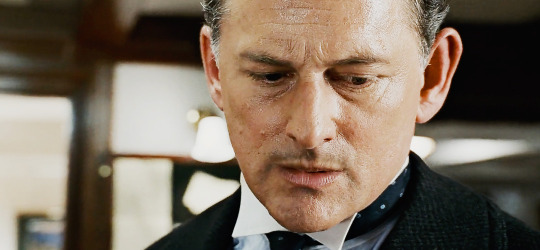
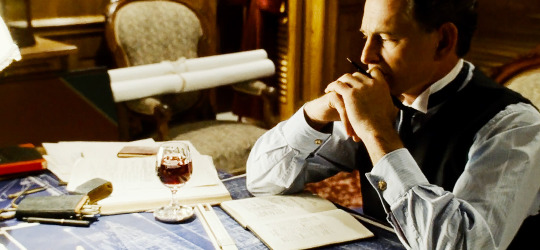


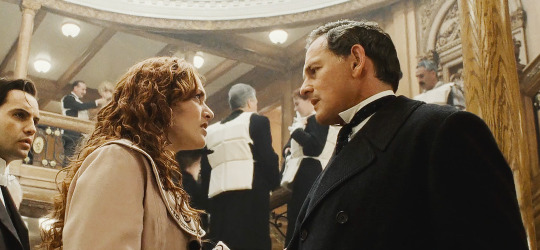

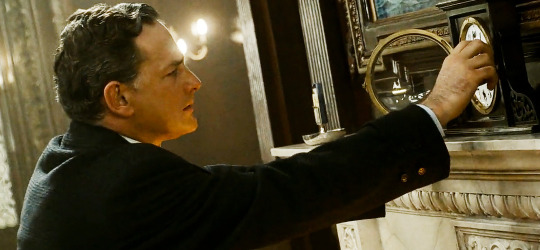
Well, I may have knocked her together, but the idea was Mr. Ismay's. He envisioned a steamer so grand in scale, and so luxurious in its appointments, that its supremacy would never be challenged. And here she is...willed into solid reality.
#titanicedit#thomas andrews#titanic#titanic 1997#victor garber#my edit*#movie: Titanic (1997(#i am always sad about him#and victor always has the most heartbreaking expression#or perfect smile#damn you sir#this was hard cause i had....at least 40 screencaps to pick from
304 notes
·
View notes
Text
First few lines of Hymn to the Sea chapter six, chapter already up:
As Pete finished speaking, Colonel Gracie's voice rang out with conviction, "All life is a game of luck."
Tom discreetly rolled his eyes, careful not to draw any attention to himself. He could already feel his father's disapproving gaze on him, ready to scold him for his improper behavior. But instead of lecturing him, his father simply retorted to Gracie's statement, "A real man makes his own luck, Archie."
Tom glanced over at his seatmate, Thomas Andrews, and noticed him furiously scribbling in a small notebook. His hand moved quickly and purposefully, as if the words could not be written fast enough. He seemed completely absorbed in his task, unaffected by the conversation happening around him.
"Mr. Andrews, what are you doing?" Tom asked, curiosity piqued as he reached over and plucked the notebook from Mr. Andrews' grasp. His eyes scanned the page, revealing neat rows of handwritten notes detailing intricate details about the ship they were aboard. "Increase number of screws in hat hooks from 2 to 3," Tom read aloud, a tinge of awe creeping into his voice as he marveled at the level of detail Mr. Andrews was taking into account. "You build the biggest ship in the world and this preoccupies you?" Tom couldn't help but ask incredulously, shaking his head in disbelief as Mr. Andrews smiled sheepishly.
"He knows every rivet in her, don't you Thomas?" Mr. Ismay interjected with a teasing glint in his eye.
"All three million of them," Mr. Andrews responded proudly, chest puffing out slightly as he spoke.
"His blood and soul are in this ship." Mr. Ismay added with a twinkle in his eye. "She may be mine on paper, but in the eyes of God she belongs to Thomas Andrews."
"Your ship is a wonder, Mr. Andrews." Tom complimented sincerely. "Truly."
"I am glad you think so, Tom," Mr. Andrews replied kindly, his eyes shining with pride.
8 notes
·
View notes
Text
Thomas Andrews x reader - Protective
Summary: Thomas has always been protective of his love. But one day Bruce Ismay and Caledon Hockley threaten her and Thomas doesn’t like that. (Reader is 18-21) (Bruce is 42 and Caledon is 32)
Warnings: small cursing, threats to reader, protective Thomas
(This was another request! Thank you so much for requesting this!!💙💙)
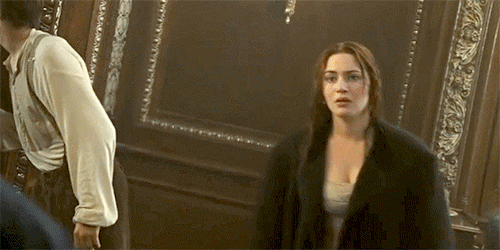

—————————————
I walked out of my state room, dressed in one of my favorite gowns. I was walking down to the lobby to meet Thomas so the two of us could go to dinner with our friends. I saw Thomas standing at the bottom of the stairs and walked to him, kissing him on the cheek as a greeting.
“You always look so beautiful my love.” Thomas whispered to me as I wrapped my hand around his bicep and he walked me to the dining room. We saw our friends slowly filling the table and joined them. Thomas pulled out my chair for me, gently pushing me in before sitting down beside me. I was now in between Thomas and Bruce Ismay. The other residents at the table were Margret brown, Ruth, rose, Caledon, and a few others and their wives.
The dinner went as usual, polite conversation and drinking wine. Then dinner was over. Thomas and me walked out of the dining room and to the deck of the boat. We sat on a bench beside each other and looked out into the glistening water. I laid my head on Thomas’ shoulder and he kissed it.
“You are so talented Thomas. Building this ship and letting me come with you.” I praised him. He slide his arm around my waist and gently ran his fingers on my side, sending shivers through my body.
“Thank you love, I love you y/n.” He said with a smile.
“I love you too Thomas.” We we’re about to kiss when the captain of the ship interrupted us.
“I’m sorry to intrude but we need your assistance in the kitchen please Mr.Andrews.” The captain said. Thomas nodded and sadly got up. He kissed my head once more and bid goodbye to me. I frowned as I watched him walk away. I loved spending time with him. But of course as the building and owner of the ship, he had duties to attend to.
I kept looking out at the water, but then I heard heavy footsteps behind me. I turned around slightly and saw Caledon with Bruce.
“Hello y/n, you look like a diamond this evening.” Bruce said as him and Caledon moved to stand in front of me.
“Oh uh, thank you.” I said politely. The two men had always made me uncomfortable, ever since I met them.
“Care to come to my stateroom this evening? I’m sure Thomas wouldn’t mind.” Bruce said as he sat beside me and moved closer to my body. I moved away from him as far as I could and my breath started to quicken.
“No sir, I’m engaged to Thomas. I cannot go with you.” I told him. Bruce scowled and Caledon pulled out a small hand gun. I sucked in a breath and my eyes stayed glued to the gun that was pointed at me.
“Go with Bruce, or you’ll be shot. Give him what he wants.” Caledon said. I shook my head and tried to get up but Bruce caught my wrist and pulled me back down to him.
“Do not try and run. We can do this the easy way or the hard way.” He sneered as he started to kiss my neck. I whimpered and tried to fight against the men. But it was no use. I was nothing compared to them in strength.
“That’s more like it.” Bruce said. He started to touch my thigh and move his hand higher. I tried to squirm but Caledon pressed the gun against my head. This was it. I was going to be taken advantage of or killed. And there was nothing I could do to stop it.
“Hey let go of her!” I heard Thomas yell. I looked over and saw him quickly coming towards me and the two men. Bruce's eyes went wide then an idea popped into his head. Caledon was glancing at Bruce, trying to figure out their next move.
"Oh Mr. Andrews thank god you're here. You see Y/n was trying to kiss me and seduce me. I was trying to stop her but she wouldn't stop." Bruce said. I felt sick to my stomach. I hate this man.
"Very good try Mr. Ismay. I saw what happened. You were trying to kiss her. and I know my y/n she wouldn't betray me so. Now leave and go to your rooms before I call ship security. And never look in y/n's direction again." Thomas said. Bruce went pale and he nodded before he scurried away with Caledon behind him.
Thomas turned towards me and engulfed me in a tight hug. I relaxed against his chest and wrapped my arms around his waist. He rocked the two of us lightly and kissed my head before resting his cheek on my head.
"thank you Thomas. I didn't know what to do." I said.
"Y/n you don't need to thank me. I didn't mind, they shouldn't have done that and those two are cowards. All that's important is that you're safe and well. I still will call the officers and have them take care of the two but for now it's just you and me." Thomas told me.
"Thomas Caledon threatened me. They both did. They had a hand gun and they said that if I didn't give Mr. Ismay what he wanted that they would shoot me. Thomas I was so scared, I was certain I was going to be raped or die." I cried gently into Thomas' chest. Thomas pet my hair and cradled my body.
"I'm so sorry y/n. Let us go have a nice warm bath together then we can lay in bed. How does that sound?" He offered.
"I would like that."
"well then lets go, forget about them. They do not deserve to know your name. You are so precious and wonderful. You're my world y/n"
Thomas kissed me then took my hand and walked me to our state room. We had the bath then just laid in each others arms and fell asleep.
#x reader#the titanic#thomas andrews#fanfic#fanfiction#x y/n#fluff#reader insert#angst#y/n#thomas andrews titanic#thomas andrews x reader#Bruce ismay#caledon hockley
113 notes
·
View notes
Text
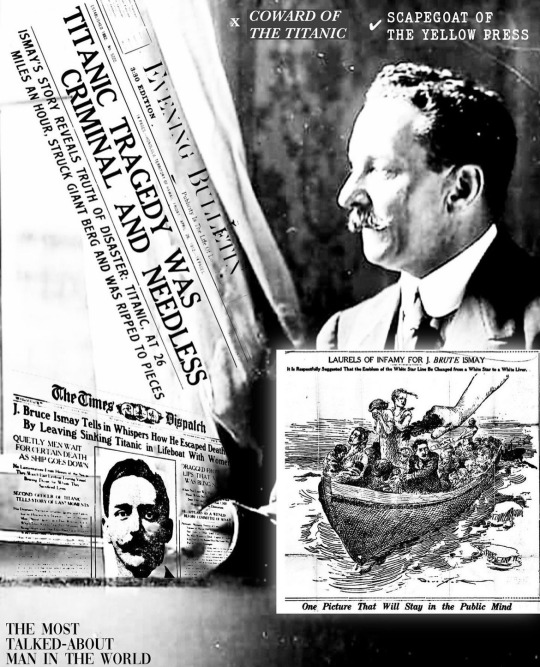



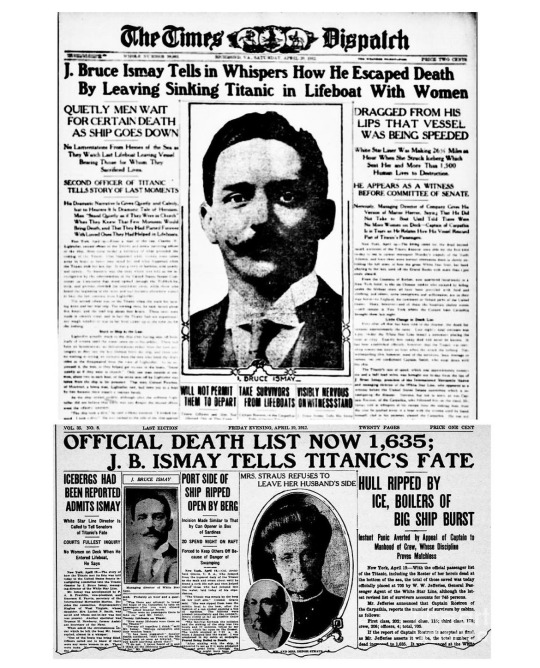


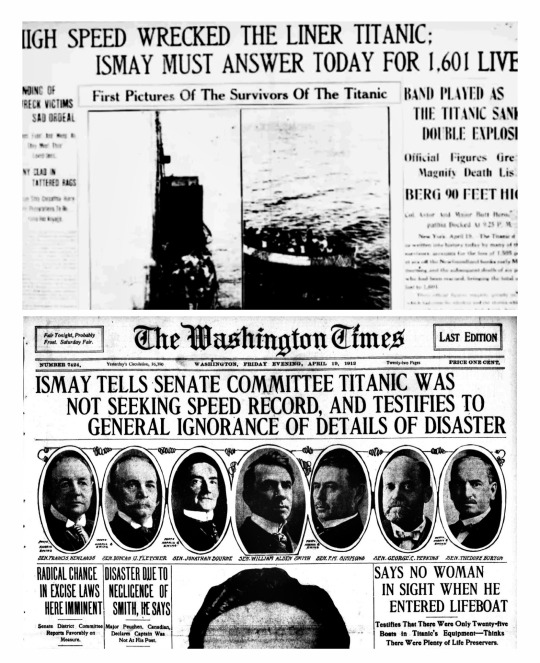

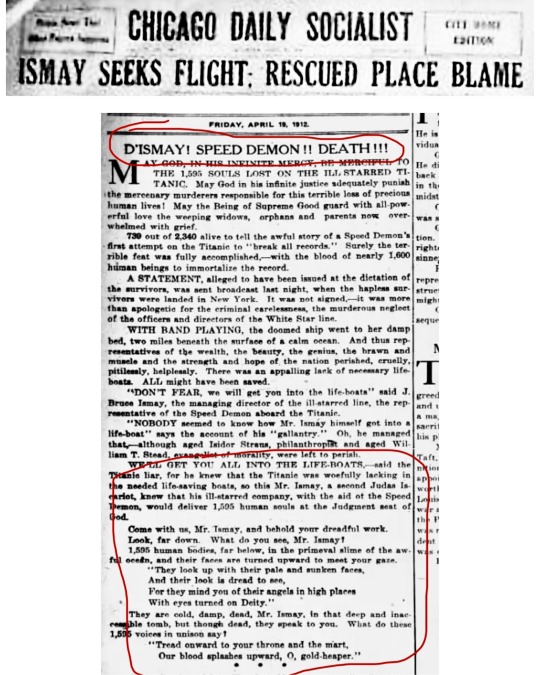
──── MR. ISMAY IN THE YELLOW PRESS
❝ By Tuesday 16 April, the whole world knew who J. Bruce Ismay was. [ … ] The most serious accusation against Ismay was that he put profit before lives, dictating the ship’s speed to the Captain in order to get to New York in record time. ❞
- How to Survive the Sinking of the Titanic
#titanic 1997#rms titanic#titanicedit#titanic movie#j. bruce ismay#* titanic#historyedit#cancel culture#james cameron titanic#rose dewitt bukater#jack dawson#cal hockley#* callie’s content#* rms titanic
84 notes
·
View notes
Text
Andrews: "Mr Ismay? What are you doing?"
Ismay: *standing on a chair* "It's my ship, so I can stand wherever I want."
Andrews: ......
Ismay: ......
Andrews: "Where's the spider?"
Ismay: "It's under the table. Please get it for me."
26 notes
·
View notes
Text
Mrs. Shelby - Chapter 22 - Goodbye Johnboy
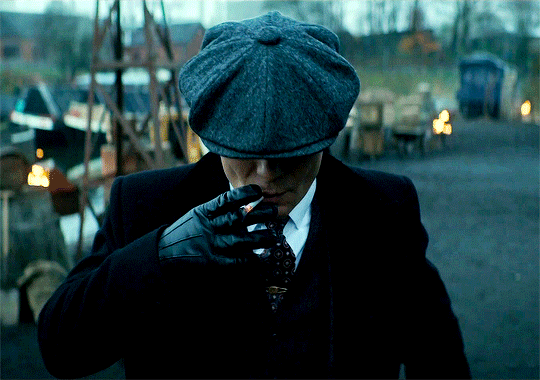
Masterlist
Fic Masterlist
Join Taglist
Taglist:
@ell0ra-br3kk3r
@noirrose21-blog
@vanhelsingsbigtoe
Thank you for getting this far, this will be the last chapter of this story. 💕
Even in the long-uninhabited house, it's not cold, but I still tighten my collar. Ismay... she must have left with the children, something she always wanted. Everyone has their own aspirations, which is understandable. I just wonder if the Lee family will accept her as before—with her husband and ex-wife's children in tow.
"What about Maria? Is she okay, injured?" After John's release, he bought a small villa in the countryside, with a yard, where he lived with his little family. He survived the gunfire on the hellish battlefield, only to die in a shameful ambush.
"Do you want to take her in?" Tommy, still holding the phone, just turned his head to ask me.
"If she's willing, do you mind?" Despite Tommy's attempts to stop me, I still went to John's house. ...Maybe now it can only be called a house.
It's winter now, the yard desolate, remnants of snow covering dry grass, dark red traces winding on the stone path. Without a fireplace, the living room on the first floor is as cold as an ice cellar.
Ismay is not at home, only the children wrapped in thick blankets huddle in the attic. When they see me, they all rush over. I make some hot milk, tuck them into bed, just like seven years ago.
Seven years ago... it was also winter when the Shelby brothers returned from the battlefield. Birmingham train station seems to float before my eyes, John's hearty laughter piercing through the lingering smoke...
I lower my head, wiping my eyes. "Dad is gone."
Maria sits next to me, looking out the window like me. I turn to look at her, but can't find any words to comfort her—because this is the truth. She's 13 now, buried her mother with me, and I can't use the words like "he just went to a place we can't go" to fool her.
"I'm an orphan," she says, her voice choking, trembling as she wipes her eyes.
I embrace her.
I know, just as I thought, even if Maria has no malice towards Ismay, and they get along well, Maria will not admit another woman as her mother. Just like me back then, Maria won't face the ruthless relatives dividing the property, even if Ismay leaves the Shelbys, I'll find a lawyer to settle John's assets and hand them over to her personally. A widow with her children returning to the wilderness needs financial support. Society, even the Gypsy society, is too malicious towards orphans and widows. I think John would agree with what I'm doing.
Once she calms down, I bring up my intention to her, "Dear, would you like to come and live with us?"
"What about Harry and them?"
"Just you."
It's not that Tommy and I can't afford to raise Maria's half-siblings, relying on my own assets would be enough to support them, along with my sons, without worry. But now we're at a disadvantage, it's not easy to take care of more children, and I don't want those Italians to use Martha and John's children as bargaining chips. Even if Ismay wants to leave the Shelbys, I'll calculate John's assets with a lawyer and hand them over to her personally. A widowed woman with her children returning to the wilderness needs financial support. Society, even the Gypsy society, is too malicious towards orphans and widows. I think John would agree with what I'm doing.
"I'll take care of them."
"Even in this situation, you still think about those children?"
"What can I do, Maria?"
After finishing the conversation, I still went to John's house...
Maybe now it can only be called a house.
Now it's winter, the yard is desolate, the remaining snow covers the dry grass, and dark red traces wind on the stone path. Without a fireplace, the living room on the first floor is as cold as an ice cellar.
Ismay is not at home, only the children wrapped in thick blankets huddle in the attic. When they see me, they all rush over. I make some hot milk, tuck them into bed, just like seven years ago.
Seven years ago... it was also winter when the Shelby brothers returned from the battlefield. Birmingham train station seems to float before my eyes, John's hearty laughter piercing through the lingering smoke...
I lower my head, wiping my eyes. "Dad is gone."
Maria sits next to me, looking out the window like me. I turn to look at her, but can't find any words to comfort her—because this is the truth. She's 13 now, buried her mother with me, and I can't use the words like "he just went to a place we can't go" to fool her.
"I'm an orphan," she says, her voice choking, trembling as she wipes her eyes.
I embrace her.
I know, just as I thought, even if Maria has no malice towards Ismay, and they get along well, Maria will not admit another woman as her mother. Just like me back then, Maria won't face the ruthless relatives dividing the property, even if Ismay leaves the Shelbys, I'll find a lawyer to settle John's assets and hand them over to her personally. A widow with her children returning to the wilderness needs financial support. Society, even the Gypsy society, is too malicious towards orphans and widows. I think John would agree with what I'm doing.
Once she calms down, I bring up my intention to her, "Dear, would you like to come and live with us?"
"What about Harry and them?"
"Just you."
It's not that Tommy and I can't afford to raise Maria's half-siblings, relying on my own assets would be enough to support them, along with my sons, without worry. But now we're at a disadvantage, it's not easy to take care of more children, and I don't want those Italians to use Martha and John's children as bargaining chips. Even if Ismay wants to leave the Shelbys, I'll calculate John's assets with a lawyer and hand them over to her personally. A widowed woman with her children returning to the wilderness needs financial support. Society, even the Gypsy society, is too malicious towards orphans and widows. I think John would agree with what I'm doing.
"I'll take care of them."
"Even in this situation, you still think about those children?"
"What can I do, Maria?"
After finishing the conversation, I still went to John's house...
Maybe now it can only be called a house.
Now it's winter, the yard is desolate, the remaining snow covers the dry grass, and dark red traces wind on the stone path. Without
a fireplace, the living room on the first floor is as cold as an ice cellar.
Ismay is not at home, only the children wrapped in thick blankets huddle in the attic. When they see me, they all rush over. I make some hot milk, tuck them into bed, just like seven years ago.
Seven years ago... it was also winter when the Shelby brothers returned from the battlefield. Birmingham train station seems to float before my eyes, John's hearty laughter piercing through the lingering smoke...
I lower my head, wiping my eyes. "Dad is gone."
Maria sits next to me, looking out the window like me. I turn to look at her, but can't find any words to comfort her—because this is the truth. She's 13 now, buried her mother with me, and I can't use the words like "he just went to a place we can't go" to fool her.
"I'm an orphan," she says, her voice choking, trembling as she wipes her eyes.
I embrace her.
I know, just as I thought, even if Maria has no malice towards Ismay, and they get along well, Maria will not admit another woman as her mother. Just like me back then, Maria won't face the ruthless relatives dividing the property, even if Ismay leaves the Shelbys, I'll find a lawyer to settle John's assets and hand them over to her personally. A widow with her children returning to the wilderness needs financial support. Society, even the Gypsy society, is too malicious towards orphans and widows. I think John would agree with what I'm doing.
Once she calms down, I bring up my intention to her, "Dear, would you like to come and live with us?"
"What about Harry and them?"
"Just you."
It's not that Tommy and I can't afford to raise Maria's half-siblings, relying on my own assets would be enough to support them, along with my sons, without worry. But now we're at a disadvantage, it's not easy to take care of more children, and I don't want those Italians to use Martha and John's children as bargaining chips. Even if Ismay wants to leave the Shelbys, I'll calculate John's assets with a lawyer and hand them over to her personally. A widowed woman with her children returning to the wilderness needs financial support. Society, even the Gypsy society, is too malicious towards orphans and widows. I think John would agree with what I'm doing.
"I'll take care of them."
"Even in this situation, you still think about those children?"
"What can I do, Maria?"
After finishing the conversation, I still went to John's house...
Maybe now it can only be called a house.
Now it's winter, the yard is desolate, the remaining snow covers the dry grass, and dark red traces wind on the stone path. Without a fireplace, the living room on the first floor is as cold as an ice cellar.
Ismay is not at home, only the children wrapped in thick blankets huddle in the attic. When they see me, they all rush over. I make some hot milk, tuck them into bed, just like seven years ago.
Seven years ago... it was also winter when the Shelby brothers returned from the battlefield. Birmingham train station seems to float before my eyes, John's hearty laughter piercing through the lingering smoke...
I lower my head, wiping my eyes. "Dad is gone."
Maria sits next to me, looking out the window like me. I turn to look at her, but can't find any words to comfort her—because this is the truth. She's 13 now, buried her mother with me, and I can't use the words like "he just went to a place we can't go" to fool her.
"I'm an orphan," she says, her voice choking, trembling as she wipes her eyes.
I embrace her.
I know, just as I thought, even if Maria has no malice towards Ismay, and they get along well, Maria will not admit another woman as her mother. Just like me back then, Maria won't face the ruthless relatives dividing the property, even if Ismay leaves the Shelbys, I'll find a lawyer to settle John's assets and hand them over to her personally. A widow with her children returning to the wilderness needs financial support. Society, even the Gypsy society, is too malicious towards orphans and widows. I think John would agree with what I'm doing.
Once she calms down, I bring up my intention to her, "Dear, would you like to come and live with us?"
"What about Harry and them?"
"Just you."
It's not that Tommy and I can't afford to raise Maria's half-siblings, relying on my own assets would be enough to support them, along with my sons, without worry. But now we're at a disadvantage, it's not easy to take care of more children, and I don't want those Italians to use Martha and John's children as bargaining chips. Even if Ismay wants to leave the Shelbys, I'll calculate John's assets with a lawyer and hand them over to her personally. A widowed woman with her children returning to the wilderness needs financial support. Society, even the Gypsy society, is too malicious towards orphans and widows. I think John would agree with what I'm doing.
"I'll take care of them."
"Even in this situation, you still think about those children?"
"What can I do, Maria?"
After finishing the conversation, I still went to John's house...
Maybe now it can only be called a house.
Now it's winter, the yard is desolate, the remaining snow covers the dry grass, and dark red traces wind on the stone path. Without a fireplace, the living room on the first floor is as cold as an ice cellar.
Ismay is not at home, only the children wrapped in thick blankets huddle in the attic. When they see me, they all rush over. I make some hot milk, tuck them into bed, just like seven years ago.
Seven years ago... it was also winter when the Shelby brothers returned from the battlefield. Birmingham train station seems to float before my eyes, John's hearty laughter piercing through the lingering smoke...
I lower my head, wiping my eyes. "Dad is gone."
Maria sits next to me, looking out the window like me. I turn to look at her, but can't find any words to comfort her—because this is the truth. She's 13 now, buried her mother with me, and I can't use the words like "he just went to a place we can't go" to fool her.
"I'm an orphan," she says, her voice choking, trembling as she wipes her eyes.
I embrace her.
I know, just as I thought, even if Maria has no malice towards Ismay, and they get along well, Maria will not admit another woman as her mother. Just like me back then, Maria won't face the ruthless relatives dividing the property, even if Ismay leaves the Shelbys, I'll find a lawyer to settle John's assets and hand them over to her personally. A widow with her children returning to the wilderness needs financial support. Society, even the Gypsy society, is too malicious towards orphans and widows. I think John would agree with what I'm doing.
-
A few months passed, and life in Small Heath began to settle into a new rhythm. The Shelby family faced the challenges that came their way with the resilience that defined them. The absence of John was felt deeply, but they carried his memory forward.
Maria, now a part of the Shelby household, brought a different energy into the home. Despite the hardships, she managed to bring laughter and warmth back into the lives of the Shelby children. Ada, always the pragmatic one, helped guide the family through the intricacies of their evolving circumstances.
As winter gave way to spring, Thomas Shelby found solace in the routines of daily life. The business thrived, and alliances were forged that solidified the Shelby name in Birmingham. He and Grace grew closer, finding comfort in each other's presence amidst the storm that had passed.
One day, as Thomas walked through the garden behind the Shelby residence, he found Grace sitting on a bench, lost in thought. The scent of blooming flowers filled the air, and the sun cast a gentle warmth upon them.
"Tommy," Grace said, breaking the silence, "I never expected this life, but I wouldn't trade it for anything."
He sat down beside her, his gaze fixed on the horizon. "We've been through hell and back, Grace. But here we are."
She turned to him, a soft smile playing on her lips. "For Johnboy," she whispered.
Thomas nodded, the weight of their shared losses hanging in the air. "For Johnboy," he echoed, intertwining his fingers with hers.
The Shelby family, though scarred by the battles of the past, found strength in each other. The Shelby Company continued to prosper, and Small Heath, once a battleground, now stood as a testament to their resilience.
In the evenings, Thomas and Grace would take walks through the quiet streets, hand in hand. The echoes of the past began to fade, replaced by the promise of a future they had fought hard to secure.
As they stood on the balcony of their home, overlooking the city that had witnessed their triumphs and tragedies, Thomas Shelby realized that, despite the losses, life had a way of moving forward.
And so, in the fading light of the Birmingham sunset, the Shelby family found a new beginning—a testament to their strength, love, and the enduring spirit that defined them.
-
Years later, the Shelby family found themselves reflecting on the tumultuous journey that led them to where they stood. Small Heath had transformed, and the Shelby name resonated not just in Birmingham but far beyond. The once gritty streets now bore the marks of progress, but the memories of their rise lingered like shadows.
Thomas Shelby, now seasoned by time and experience, sat in his study surrounded by the relics of a bygone era. The clinking of whiskey glasses echoed as he and Diana raised a toast to the legacy they had built. The photographs on the walls captured moments of triumph, loss, and the indomitable Shelby spirit.
As he looked at the framed picture of John, a bittersweet smile crossed Thomas's face. The pain had dulled with the passage of years, but the bond with his late brother remained etched in his heart.
Ada, a pillar of strength for the family, had forged her own path. Her intelligence and resilience had taken her beyond Birmingham's confines, and she had become a symbol of women breaking barriers.
Tommy's children had grown into formidable individuals, inheriting the Shelby grit. Charlie, with a keen mind for business, played a crucial role in expanding the Shelby Company. His sister, Mary, had become a force to be reckoned with, embodying the Shelby strength in every decision she made.
Arthur, though scarred by his past, had found redemption through love. His family had helped him conquer the demons that once haunted him, and he had become a symbol of transformation.
Diana, sitting beside Thomas, reflected on the sacrifices made and the victories earned. The love between them had weathered storms, and their partnership had become the backbone of the Shelby legacy.
The Shelby Company had diversified its interests, and its influence stretched across various industries. The family had navigated the treacherous waters of politics, business, and crime, emerging not unscathed but victorious.
In the dim light of the study, Thomas raised a photo of the entire Shelby family—past and present. His gaze lingered on the faces of those who were no longer there, a silent acknowledgment of the cost of their chosen path.
As the clock ticked, the Shelby family continued to stand against the currents of time. The streets of Small Heath whispered tales of their triumphs and struggles, a testament to the indelible mark the Peaky Blinders had left on history.
And so, with the weight of their legacy behind them, the Shelby family faced the future, their story forever etched in the annals of Birmingham's history.
Fin
#cillian murphy#tommy shelby#tommy shelby x reader#peaky blinders#thomas shelby#peaky blinders fanfiction#tommy shelby imagine#thomas shelby x reader#tommy shelby fanfic#fanfiction
22 notes
·
View notes
Text

ONCE UPON A TIME, THE WHITE STAR LINE had been Bruce Ismay’s CHAINS. His duties as HEIR kept him tethered to his dictatorial father’s reign, serving as a permanent prison from which he could never escape ( not that the rebellious youth he’d once been ever stopped trying ). Granted, White Star STILL served as his chains even after all these years — but at least things were now different.
Now, Mr. Ismay had built something BEAUTIFUL out of his pain — albeit, not without enormous CONSEQUENCE.

The consequence in question was an OMEN from the gods, delivered straight to the doorstep of Mr. Andrews one fateful March morning just a few months prior. It was this magnificent omen which now gazed upon an equally magnificent and equally legendary creature, her eyes wide and lips parted in pure, unapologetic AWE. Stolen from Titanic was her capacity for speech by this sight — until, of course, she regained some semblance of her wits.
❝ You must be Nagini. ❞ Soft were these words, uttered by Titanic in a DEFERENTIAL tone amidst her bowed head. ❝ It is a pleasure to finally make your acquaintance. ❞

╰► @rh4egar LIKED FOR A STARTER.

#HERE take N.agini meeting Ani in the Bruce-R.hae same age au#✎ ; universe / timeline ── ❛ help will always be given at hogwarts to those who ask for it ❜ ── wizarding world#╭ ⁞ ❏. narrations / anastasia andrews. (rms titanic)#╭ ⁞ ❏. closed starter.#╭ ⁞ ❏. written works.#rh4egar
5 notes
·
View notes
Text

◤‧₊˚🌈🐶˚₊‧⁺˖◢ dorothy finds herself momentarily and unintentionally distracted from her polite conversation with mr. ismay when she happens to walk by ——- anastasia, possessing the kind of beauty they write about in poems or in love sonnets. just the sight of her is enough to make the apples of her cheeks flush && give her that classic sensation of butterflies going absolutely wild in her tummy.
the farm girl is embarrassed to realize that bruce had said something to her but she has completely missed it. ❛❛ i’m so sorry, i got distracted by —- er that is to say i spaced out for a minute or two there. could you repeat the last few things you just said? oh do forgive me mr. ismay. ❜❜
starter for @historiavn for bruce ismay

4 notes
·
View notes
Text
While Jack and rose was a tragic story, the actors playing the passengers are hella underrated.
The mothers holding their children, trying to comfort them knowing they're going to die. The priest trying to comfort those praying with him despite struggling to accept he will die. The people on the life boats who can do nothing but sit and listen to the screams of several hundred people and the groaning breaking of the ship. Having to sit in the pitch black night and listen as the screams slowly faded into silence, listening to people dying. The actors screaming in the movie is too real, the terror on the actors faces too real. Rose watching the young girl her age plumet to her death. The passengers who didn't speak any or much English. Mr andrews and his "im sorry i didnt build you a better ship". The captain realizing he let Mr. Ismay push him against his better judgement and sentencing hundreds to a terrifying and tragic death over pride. Mr. Ismay and the guilt and shame of saving himself instead if giving that spot to another would who hadn't condemned a shipful of people. The sailors trying to load people onto boats, having to make the decision to stay away knowing panicking people would absolutely drown them.
The actors portrayed this so incredibly that their stories were more emotionally taxing than Jack and rose.
Don't get me wrong, rose realizing jack is dead and then the joy of rejoining him at the end with her loved ones from the titanic. He'll I almost tear up.
But the actors for the passengers and crew...
4 notes
·
View notes
Text
Today I watched an older video of “Tasting History with Max Miller” on YouTube, and was oddly amused by the idea of chartreuse jelly with peaches being the last thing many 1st class passengers ate on April the 14th, 1912.

That prompted me to research more about the Titanic. One thing led to another and I’m looking up photos of the wreck of the Titanic, as you do. I typed “Titanic today”, because I heard the wreck is literally vanishing.
And then…movie showtimes appear in my Google search. Multiple theaters, multiple showings.
Being a little confused, I looked deeper into this, and as it so happens:
We are now at the 25th anniversary of the film “Titanic”.
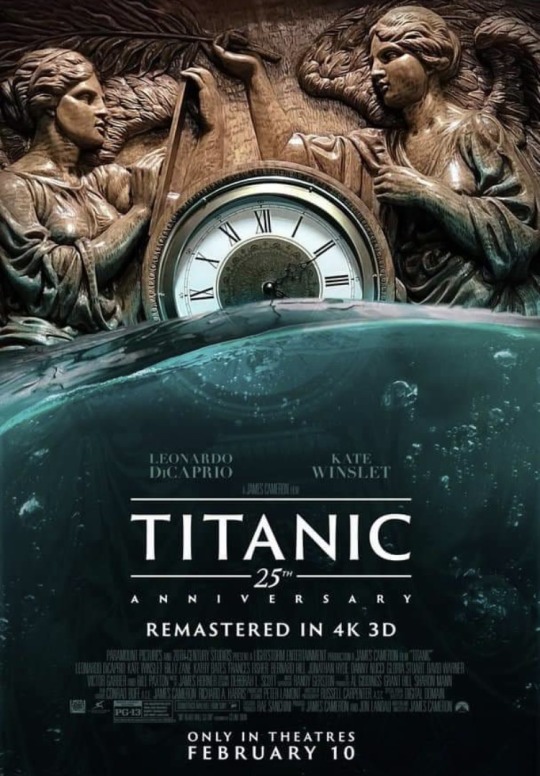
Why are we still captivated by the Titanic and it’s maiden voyage, which happened 110 years ago?
Why am I still thinking about the Titanic movie? That was apparently 25 years ago! But it feels like 84 some days.
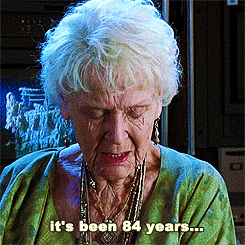
Was I the perfect age at 11/12 for the 1997 movie to capture my imagination? I guess so. I was the perfect preteen age for the Titanic film, as well as The Spice Girls and later as a teenager, the Lord of the Rings. The stars aligned for me.
You think people are nuts about it now? People were Titanic-Crazy in 1997/98! The local library hosted a Titanic movie night (“A Night to Remember”, an old black and white film), and I also attended a Titanic themed tea party. I read the CD insert of the Titanic soundtrack while listening to Celine Dion’s “My Heart Will Go On”. My mom sewed a beautiful costume for my sister who dressed as Rose for Halloween, complete with the Heart of the Ocean “diamond” necklace.
Old tech alert: I remember when the 1st vhs ended and it was time to take the 2nd half of the movie out and pop it in the vcr.
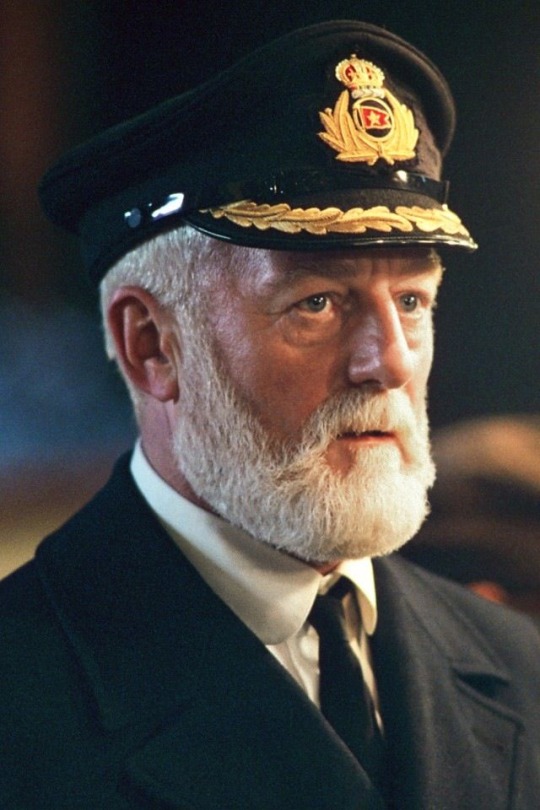
“Well, I believe you may get your headlines, Mr. Ismay,” - Captain John Smith. Then…black screen.
Technically it’s a disaster movie, but it had the love story and that did it for many people.
If I’m honest, the love story wasn’t my favorite but the sinking in almost real time was thrilling. I also loved and still love the costumes and the set decorations and the music.
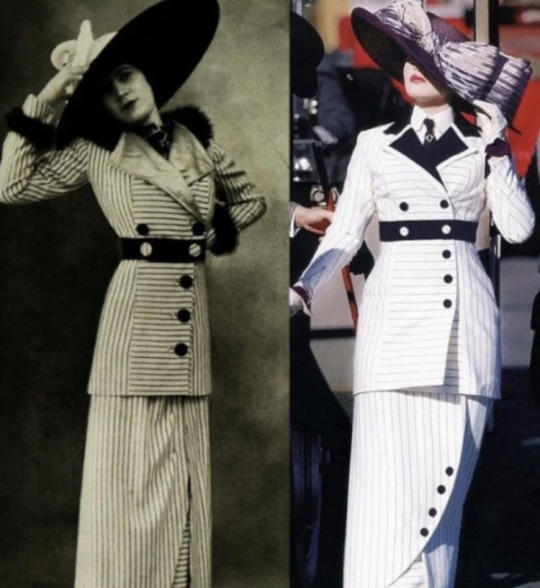
I think seeing a young girl finding joy in life and deciding that she’s never going to be small and meek ever again, was my favorite thing.
Rose got to do everything she and Jack talked about (including, I imagine, throwing up on the Coney Island roller coaster). If she hadn’t met Jack, she’d be long dead inside, if not actually passed on. Her life force was in danger of being snuffed out at 17. She was literally suicidal. I think they could have had this storyline without the whirlwind romance but, at the end of the day that’s what sells.
I vividly remember my theater experience watching it. I was not allowed to watch 2 scenes:
1. When Jack draws Rose like one or his French girls. (So, I peeked through my fingers anyway. And seeing the gorgeous Kate Winslet posing nude on a couch awakened something in me…yeah I’m Bi. My friends swooned over Jack; I had complicated feelings about Rose, and didn’t understand them yet.).

2. And toward the end when we see frozen dead, wide eyed people being pulled from the dark water. I actually listened to my mom and didn’t look; many years later I looked and I’m still sorry.
I also remember looking around me during Jack’s death/“I’ll never let go!” scene, and seeing in every direction in the movie theater, crying women and girls. Tears streaming down faces, heaving sobs, ugly crying. Faces lit up by the blue light the screen was giving off; the scene was a blue dimly lit one.
I never cried at that scene. But I always cry or tear up at these scenes:
1. The father telling his children they’ll be separated only for a little while, as they cry for him from the lifeboat.
2. The scene when the 3rd class mother tucks her children into bed, telling them a bedtime story. The lifeboats were gone, and the ship was sinking fast, and she knew they would die.
I’m not sure how, as a parent, you don’t feel something during these scenes.
I’m not going to go to the theater to experience 4k Titanic. But it’s fun to revisit this movie.
#max miller#tasting history#youtube#titanic#1997#1998#captain john smith#25th anniversary#chartreuse#peaches#jello mold#james cameron#king of the world#4k#3d#rose and jack
29 notes
·
View notes
Text
Friendly reminder that Bruce Ismay wasn’t a coward btw that was all James Cameron
Oh and no one actually knows if Mr Murdoch shot anyone
Just for your information if you’re still in the tag
12 notes
·
View notes
Text
And finally, after two months, chapter four of Between Yesterday and Tomorrow is posted!
Rating: Teen And Up Audiences
Archive Warning: No Archive Warnings Apply
Category: M/M
Fandoms: Titanic (1997), Historical RPF, Titanic (1997) RPF, A Night to Remember - Walter Lord
Relationship: Charles Lightoller/Harold Lowe
Characters:
Charles Lightoller, Harold Lowe, Rose DeWitt Bukater, Joseph Boxhall, J. Bruce Ismay, Arthur Rostron, Jack Thayer (1894-1945), Noel Leslie Countess of Rothes, Harold Bride, Molly Brown, Caledon Hockley, Herbert PItman, Harold Cottam, Patrick Murphy (A Night to Remember), Kate (A Night to Remember), Mrs. Clarke (A Night To Remember)
Additional Tags:
Hurt/Comfort, First Kiss, Falling In Love, Post-Traumatic Stress Disorder - PTSD, Love Confessions, RMS Titanic, Edwardian Period, Historical References, historical fiction - Freeform, Titanic Officers, White Star Line, RMS Carpathia, Grief/Mourning, Character Study, Podfic Welcome, Ensemble Cast, Other Additional Tags to Be Added, Suicidal Thoughts
Summary:
The grandest ship in the world has gone down, leaving 712 traumatized survivors to pick up the shattered pieces of their lives aboard the RMS Carpathia. In the middle of it all are Second Officer Charles Lightoller and Fifth Officer Harold Lowe.
When Charles ordered Harold into a lifeboat during the last frantic moments of the sinking, Harold was sure they’d never see each other again. The love of his life surely disappeared into the icy waters along with the unsinkable ship. But by a miraculous twist of fate, Charles survives. They’re finally reunited on the Carpathia, and after the horror of watching Titanic go down, they can no longer hide from each other or their feelings.
#titanic#titanic movie#titanic 1997#James Cameron titanic#titanic film#a night to remember#titanic fic#a night to remember fic#titanic ship#titanic sinking#titanic history#titanic historical fiction#historical fiction#titanic officers#ao3#Arthur Rostron#charles Lightoller#Harold lowe#Harold bride
11 notes
·
View notes
Note
❝ did they say how many are dead? ❞
— Bruce Ismay to Arthur Kirkland
Arthur was no stranger to death, nor to the harsh realities of sea voyages, and both were so intimately intertwined-- but it felt... different, this time.
He had involved himself in the aftermath of the sinking, not just as a retired Admiral and active foreign diplomat, but as England, and Arthur, too. He had lost friends and acquaintances, and the terror he'd felt for dear Noel had seized in his chest like a cold vice the moment he'd heard first news. (Jack, normally stalwart, had been beside himself with worry.)
He made himself look Mr. Ismay in the eye, his own green gaze reflecting genuine concern and sorrow. Arthur knew what he was asking--he wouldn't condescend and bandy about with excuses about 'exact numbers'. One simply didn't ask how many were dead if one was after cold statistics. (Not usually.)
After a brief moment, where Arthur could chose his words and tone, he answered:
"There are roughly 700 survivors, Mr. Ismay." Out of a total of 2,240 passengers and crew.
It was a blunt answer for a blunt question, but he had tried to deliver it plainly and with respect. It was all that could really be done.
2 notes
·
View notes
Text
This is one of the most smirk worthy moments of the first volume of Charles de Gaulle's war memoirs:
"... on October 7th [1941] I addressed a note to Mr. Churchill to update him on our wishes and means [to have the Free French engaged in the North African front]... At the same time, I wrote to general Auchinleck, commander in chief of the east, to remind him of how much we wanted our troops to fight in Libya... On October 9th I visited Mr. Margesson, War minister of Great Britain, and I begged him to intervene. Finally, on October 30th, I instructed general Catroux on the conditions in which it was convenient that our forces were employed, that is, in big units.
I did not receive any British response until November 27th. It was addressed by general Ismay and Mr. Churchill. Their letter was the equivalent to a rotund rejection, as polite as it was sharp. To explain their refusal, our allies appealed to "the dispersion of the French units across different spots in Syria", the fact that "they were not trained to act as divisions or brigades", and finally, "the insufficiency of their equipment". They expressed, however, the wish that, sometime in the future, the question could be re-evaluated.
The English command was evidently planning on achieving the conquest of Libya and ending Rommel without the French. It is true that they had there considerable land and air forces, and that they believed admiral Andrew Cunningham -magnificent chief and sailor- to be in a position to do more than miracles, by intercepting the communications between Italy and Tripolitania.
It is to be easily imagined the disappointment that the English answer produced in me. I could not allow our troops to remain inactive for time indefinite, while the fate of the world was being sorted in battle. I would rather risk a change of direction. And so, then, I called Mr. Bogomolov and I asked him to make his government know that the National Comittee wished for some French forces to participate directly in the allied operations on the Eastern Front, in case the North African theater was closed to them. I, naturally, made no secret in London of my negotiation.
Even before I received an answer from Moscow, the British intentions had already changed. On December 7th, Mr. Churchill wrote to me a warm letter to tell me that "he had just learned how much general Auchinleck wished to employ a Free French brigade in the Cirenaic operations". "I know", the Prime Minister added, "that this intention matches your own wishes. I am also aware the eagerness your men have of meeting the German face to face."...
At Cairo, Catroux arranged then, with general Auchinleck, the departure towards Libya of the first light division, while Koenig, in charge of negotiating the details, obtained from our allies, a useful bonus in anti-tank materials, anti-aerial guns, and means of transport...
But, if the first light division got an opportunity, nothing was being done for the second one, which languished in the East. And I was determined to see that one taking part as well in the operations. Precisely, on December 10th, Mr. Bogomolov had come to tell me that my project of sending French troops to Russia had been warmly received by his government, and that it was willing to facilitate to our forces on the spot all the necessary material. I began, then, to consider the expedition East, of not only the aviation group Normandie [which, according to De Gaulle, was the only element of the Western allies that fought on the Eastern Front], but of the second light division as well. This one, departing from Syria through Baghdad, would cross Persia in trucks and then, from Tabriz, would be transported by train to the Caucasus... On December 29th I wrote to general Ismay communicating to him my intentions, while at the same time giving the necessary instructions to general Catroux. The second light division was to depart on March 15th towards the Caucasus, unless it was admitted before that to Libya.
The British command opposed this project of moving this unit to Russia with all the possible objections. But in Moscow, on the contrary, the Soviets made a deal of it. Molotov speaking to Garreau, and Panfilov to Petit, asked us to put it in practice. Mr. Eden, once acquainted with this, entered the fray and wrote to me to support the point of view of the English military authorities. I could do nothing but defend my own, and it was the one that in the end was adopted by the end of February by the allied command. Ismay communicated it to me. Auchinleck asked Catroux to put at his disposition the second light division. This one left Syria and arrived at Libya the last days of March.
De Gaulle: you are sorry you think my divisions aren't good enough? That that is the reason why you cannot include them? No problem, I'm gonna ask Stalin if they are too poor for him as well. Well, well, well, would you look at that, apparently the Russians would be delighted and can provide what we are lacking. Oh, now they are good enough for the desert campaign all of a sudden? That's what I thought.
Iconic.
#WWII#Charles de Gaulle#History#the more I read the more impressed I am that this guy managed to get anything done
5 notes
·
View notes